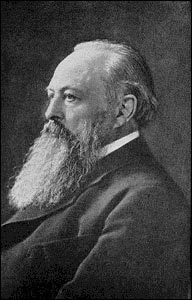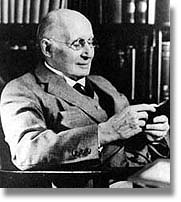
AnthonyFlood.com
Philosophy against Misosophy


October 13, 2009 (e-mail)
One knot you need un-tangled
to assist in your attempt to determine if indeed Acton and White-head
conversed is to realize that Eranos and Eranus are two distinct groups. You
are correct in your characterization of Eranos as being a phi-losophical
discussion group formed by John Ellis McTaggart (elected as a member of the
Cambridge Apostles in 1886) with fellow Apostle A. N. Whitehead (elected
1884) and other Apostles. The Eranus, however, was formed at Cambridge over
a decade earlier in 1872 as a sort of senior Apostles group by B. F.
Westcott, F. J. A. Hort and J. B. Lightfoot. Their discussion and papers
covered a wide range of disciplines, un-like the Eranos. Other early
members of the Eranus included Henry Sidgwick, J. Clerk Max-well, Alfred
Marshall, J. R. Seeley and Coutts Trotter. The Eranus carried on to
the late 1890s, and perhaps beyond, with later members including Henry
Jackson, V. H. Stanton, F. W. Maitland and Lord Acton. Acton was a member
of the Eranus (as in clouds-heavens [i.e., Gk.
Ouranos (
Dennis Palmu
Mr. Palmu's 2006 book Cutting Edge Lodged in the Groves, a defense of the King James Bible, is available from Sightler Publications.
If someone can settle this for me, I would be grateful if he or she would.
Anthony Flood
June 5, 2009
Today I heard from a scholar who distin-guished what in my ignorance I had conflated, namely, Eranus and Eranos, two Cambridge discussion groups. With his permission I gratefully post the text of his e-mail in the left column.
Anthony Flood
October 13, 2009
When Acton Met Whitehead?
Anthony Flood
Since the lives of two of my intellectual heroes, Lord Acton and Alfred North White-head, overlapped at Cambridge, I've won-dered whether the philosopher, whose fellow-ship in mathematics there (1888-1910) covers the period of the historian's Regius Professor-ship lectures (1895-98), attended any of them. There is evidence that Whitehead was interested in history and theology during his Cambridge years. But is it even ascertainable whether that interest expressed itself this way? The truth may be lost to history.
In reading Lowe’s life of Whitehead, one learns that he admired Acton, was keenly aware of his “troubles with Rome,” proposed a Cambridge memorial to him, and did indeed drop “in on some of his lectures after Acton was appointed” to that chair. (p. 186) “But I know of no discussions between them,” Lowe wrote.
Like Newton and Francis Bacon before him, Acton had rooms in Nevile’s Court. In his Lord Acton Roland Hill states that the designation of his room was “staircase 2, A1, on the first floor.” (His library would later occupy the apartment next door.) When Whitehead married [in 1891], he changed the rooms given him by Trinity College, moving from a large, high-ceilinged room (C2) in Nevile’s Court to a modest one there” until 1902, the year of Acton’s death. During the years of the lectures, therefore, Acton and Whitehead were neighbors. Someone with access to that building's plans could ascertain the proximity of the rooms in question to each other.
Lowe mentions that in the mid-1890’s the philosopher J. M. E. McTaggart formed Eranos, a discussion group and that Whitehead was a member, but he did not think much of it. James C. Holland, in his introduction to Owen Chadwick's study of Acton, notes that “it was at Cambridge that he gave it [i.e., “his commitment to moral judgment in history”] definitive and final expression, in May, 1897, in the privacy of his Trinity rooms in Nevile’s Court, where he [Acton] addressed a select society, the Eranus [sic], which never num-bered more than twelve members.” (The link I once had to an online version of Holland's introduction is now broken.)
That is, in his private rooms Acton ad-dressed, not the crowds drawn to his Regius lectures, but an elite dozen who knew each other. It therefore seems likely that if White-head attended those Eranos sessions, he may have participated in the ensuing discussions with Acton, whose path he must have crossed many times in the Nevile’s Court corridors.
But did he attend them? Perhaps an extant diary or attendance record holds the decisive fact. To the reader who could supply it and thereby remove my iota of doubt, I would be grateful, as I would if he or she would show that my transparent wish that the two men did exchange an idea or two has led me to overstate the import of the few facts I do have.